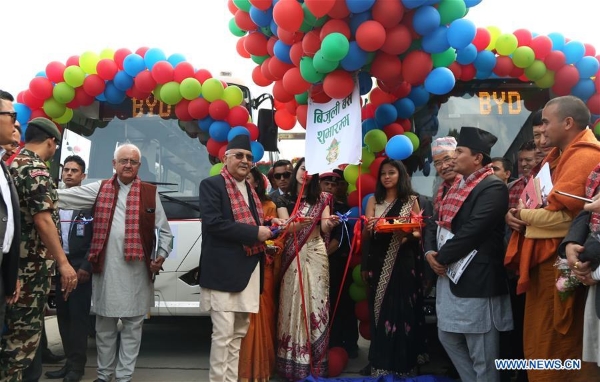Nepal launches Made-in-China electric buses for 1st time
 0 Comment(s)
0 Comment(s) Print
Print E-mail Xinhua, October 24, 2018
E-mail Xinhua, October 24, 2018
Nepal is approaching an electric future by launching the Made-in-China electric buses for the first time in the country.
Amid a special function organized in Lalitpur on Tuesday, Prime Minister KP Sharma Oli inaugurated the battery-operated buses, which have been developed by the Chinese company BYD.

The formation of electric bus fleet has been regarded as a major milestone for the South Asian country for moving towards a green economy.
Addressing the inaugural ceremony, the prime minister said the electric buses are symbolic indication of the direction that Nepal is taking towards clean energy.
"The conversion of public transport to domestically-produced electricity will displace the expensive imported gasoline and diesel. I believe the conversion to electric mobility will have a significant positive impact on environment and health of the public," Oli said.
Mentioning that the country is going to be self-reliant in hydropower with the next few years, he said that the government aims to ensure that at least 20 percent of the overall vehicles will run on electric power by 2020.
"Our overall national goal is to reduce dependence on imported petroleum products by 50 percent or even more by the year 2050," Oli said.
In the initial phase, five electric buses will be plying on streets of the capital city. Then the electric bus fleet will be operated in Lumbini, the birth place of Lord Buddha, after the construction of the international airport is completed in the region some 10 months later.
The vehicles have been financed by the Asian Development Bank and handed over to Lumbini Development Trust. In Kathmandu, the electric buses will be operated under Sajha Yatayat cooperative company.
On the occasion, the Nepalese government also launched the "National Plan of Action for Electric Mobility," which mainly focused on the promotion of electric vehicles in the country through different strategies and financing mechanisms.
The step has been regarded as a landmark also for Nepal's tourism, as the electric bus fleet will significantly reduce air pollution. Kathmandu valley has been facing severe air pollution in the past few years especially due to smoke emission from the growing number of vehicles.
"The government is committed to operating electric vehicles in the major world heritage sites in the near future," Nepali Minister for Culture, Tourism and Civil Aviation Rabindra Adhikari said.
Zhang Fan, the economic and commercial counsellor of the Chinese Embassy, said the step will contribute to the new energy development in Nepal and will strengthen collaboration between Nepal and China in the renewable energy sector.
After the inauguration, the prime minister himself took a ride in a newly launched electric bus from the event venue to his official workplace Singhadurbar.






Go to Forum >>0 Comment(s)